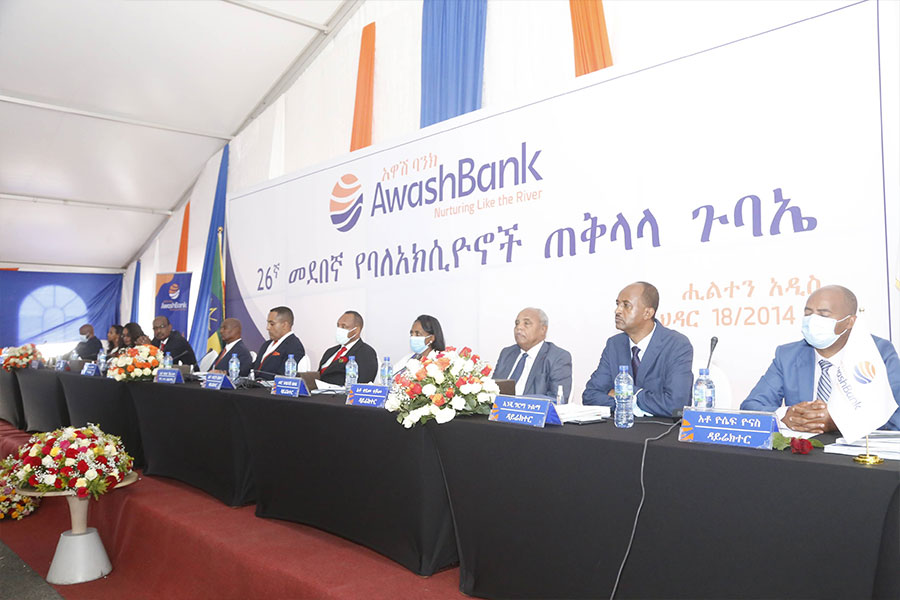
Agenda | Aug 14,2021
Jul 20 , 2019
By BERHANE HAILEMARIAM ( FORTUNE STAFF WRITER )
At a time when the central bank has authorised full-fledged interest-free banking (IFB) services, an 11th commercial bank has secured a license to operate IFB window service.
Bunna International Bank, one of the later entrants to private banking, secured the license from the central bank two weeks ago. Planning to commence the service at 10 branches in the capital and 10 more in different towns.
Branches in Dire Dawa, Harar, Adama, Jigjiga and Jimma were selected for the pilot project.
The pilot service will continue until October after which time the bank will receive a permanent authorisation from NBE, according to Abebaw Zewdie, corporate communication & promotion manager at Bunna, which netted 311.6 million Br in profit after tax in the 2017/18 fiscal year, a 76pc increase from the previous year.
Even though it has been awhile since the IFB service was implemented globally, Ethiopia has just started to adopt and use this service recently.
Eleven years ago the central bank issued a proclamation that allowed IFB service, but it limited it to window service with a directive issued three years later.
Zem-Zem Bank was the first to initiate the process to form Islamic banking in Ethiopia back in 2008. At the time, the bank was under formation and was able to collect 137 million Br in paid-up capital from 6,800 interested shareholders. But the process failed to materialise due to the absence of the directive that allows the service.
After Zem-Zem's attempt failed, Commercial Bank of Ethiopia and Oromia International Bank became the first banks to begin providing the service as a side business in 2013. Currently, 10 out of the 17 commercial banks operating in the country offer IFB products and services.
One late entrant to the IFB service was Dashen Bank, which rolled out its services in March 2018.
Most of the IFB services currently offered by banks focus on three categories: Wadi'a,Qardand Mudarabah; and two financing and investment services: Qard al Hassanand Murabahah.
Wadi'ais similar to a regular savings account. Qardis like a current account mostly used by traders, and Mudarabahis similar to a fixed-time deposit account. None of the three offer clients interest payments.
In an unrestricted Mudarabah, the bank invests money in a business that does not violate Sharia law; while in the restricted Mudarabahaccount, the bank invests in businesses of their client’s choice. The bank and the client share the profit, according to their agreement.
On Qardal Hassanfinancing and investment services, the bank undertakes export financing arrangements that enable it to get foreign currency from the transaction.
Murabahahgenerates profit for the bank through service provisions such as transactions of imports on behalf of the client.
Through these common services, the 10 banks have mobilised over 40 billion Br in resources from over three million account holders until the end of May 2019. The banks have also disbursed close to six billion Birr in loans.
Last month, the central bank issued a directive allowing the formation of a full-fledged interest-free bank. Four share companies, Zad, Zem-zem, Hijira and Nejashi, have started selling shares to open IFBs after passing the pre-application stage and have received permissions from the central bank. Two others, Kush and Huda, have also initiated a process of organising interest-free banks.
An expert in the banking sector agrees that the emergence of high competition in the service is healthy but wants to emphasise the great challenges coming with it.
As far as there are people who argue that the base for IFB window service is financed by money generated from services with interest, and the full-fledged ones are Sharia-compliant, migration is expected from the previous service to the new ones, according to Habib Mohammed.
“The window-based IFB service providers, to sustain themselves in the market, have to change their strategy and find ways of retaining their customers by adding and creating more value,” Habib said.
PUBLISHED ON
Jul 20,2019 [ VOL
20 , NO
1003]

Agenda | Aug 14,2021

Radar | Aug 26,2023

Fortune News | Jul 13,2020

Radar | Jun 22,2019

Fortune News | Dec 11,2021

Radar | Sep 27,2025

Fortune News | Oct 24,2020

Radar | Oct 11,2020

Radar | Apr 03,2021

Radar | Nov 16,2019

Dec 22 , 2024 . By TIZITA SHEWAFERAW
Charged with transforming colossal state-owned enterprises into modern and competitiv...

Aug 18 , 2024 . By AKSAH ITALO
Although predictable Yonas Zerihun's job in the ride-hailing service is not immune to...

Jul 28 , 2024 . By TIZITA SHEWAFERAW
Unhabitual, perhaps too many, Samuel Gebreyohannes, 38, used to occasionally enjoy a couple of beers at breakfast. However, he recently swit...

Jul 13 , 2024 . By AKSAH ITALO
Investors who rely on tractors, trucks, and field vehicles for commuting, transporting commodities, and f...

Oct 18 , 2025
The political establishment, notably the ruling party and its top brass, has become p...

Oct 11 , 2025
Ladislas Farago, a roving Associated Press (AP) correspondent, arrived in Ethiopia in...

Oct 4 , 2025
Eyob Tekalegn (PhD) had been in the Governor's chair for only weeks when, on Septembe...

Sep 27 , 2025
Four years into an experiment with “shock therapy” in education, the national moo...